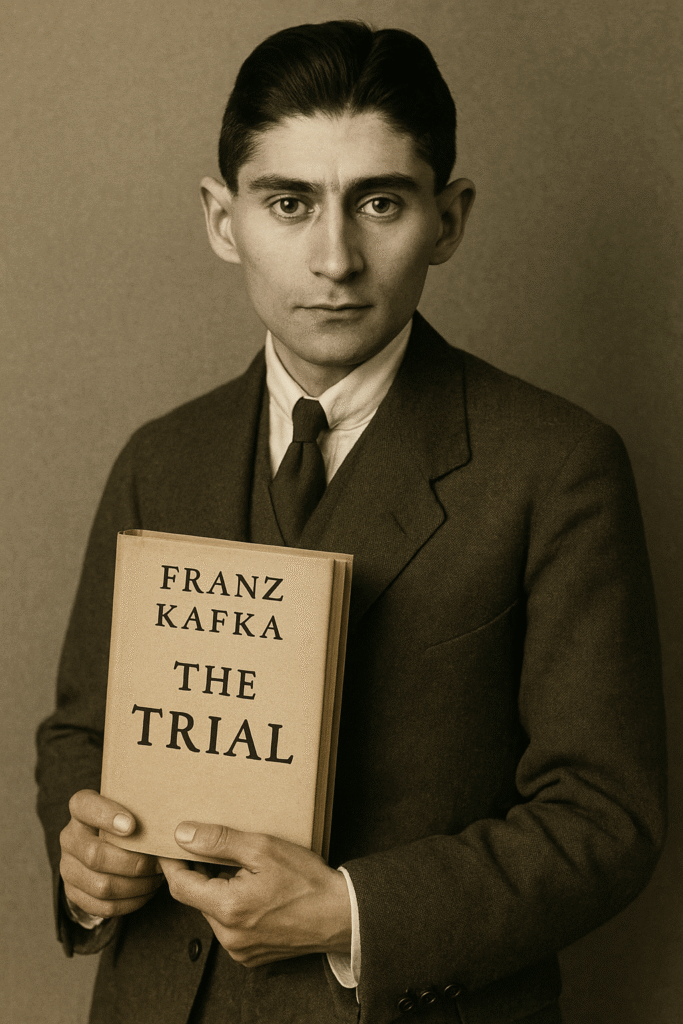By ABS, The Literary Scholar
(Who firmly believes that if life is a courtroom, Kafka never gave us the charges—just the echo of footsteps in a never-ending corridor)
Once upon a time in the grey, gaslit corners of modernity, a man woke up to find himself arrested.
Not cuffed. Not jailed.
Just politely, mysteriously, fatally… accused.
Of what? Nobody knows. Not even him.
And thus begins Franz Kafka’s The Trial—the world’s most eloquent panic attack in print.
Written in 1914 (and published posthumously in 1925, because Kafka couldn’t commit to publishing even his own psychological breakdowns), The Trial is not a legal thriller. It is existential horror disguised as clerical error. A novel where everything is out of place—except dread, which fits everywhere like a well-ironed uniform.
Meet Josef K.: The Man, the Myth, the Paperwork
Josef K. (no last name, of course—it’s Kafka) is a respectable bank employee. He eats breakfast. He owns a waistcoat. He is—by all visible measures—a solid cog in the bourgeois machine.
Then one morning, two men show up in his boarding house to arrest him. For what? No answer. Just a muttered accusation and an expectation to comply.
K is told he is free to continue living his life… but that he will be on trial.
No court date. No evidence. No charge sheet.
Just a slow descent into administrative absurdity.
“Someone must have slandered Josef K., for one morning, without having done anything truly wrong, he was arrested.”
This, dear reader, is Kafka’s version of a hook.
And once you bite, the line keeps pulling—into offices, attics, staircases, and silence.
The Court: Now Hiring Night Clerks and Existential Dread
The “court” in The Trial is not a building. It’s a state of mind.
A tangle of alleys, dusty documents, locked doors, and whispery officials who never give full answers, just ambiguity in uniform.
Every time K seeks clarity, the universe responds with:
“This is how it’s done.”
“We can’t tell you that.”
“You should know better.”
Kafka doesn’t describe a government. He describes modern anxiety with stationery.
And the real horror? Nobody is in charge. Everyone’s just doing their job—while justice is passed around like a hot potato of moral detachment.
Guilt: Presumed. Innocence: Irrelevant.
Unlike Western dramas where justice prevails, The Trial flips the narrative.
Here, guilt is presumed. Not because you’re bad. Because the system needs you to be guilty to function.
“It’s only because of their stupidity that they’re able to be so sure of themselves.”
Kafka doesn’t give us villains. He gives us cogs—petty officials, distant advocates, clueless painters, and distracted priests. Each one part of the machine, and none of them fully awake.
The Women: Sirens in the Maze
K’s journey is curiously littered with seductive, mysterious women—Leni, the washerwoman, the advocate’s nurse. They don’t offer salvation. They offer distraction.
It’s as if the system designed its own soft power—emotional entanglement as bureaucratic delay.
Feminist scholars have debated whether these women are symbols of temptation, surveillance, or simply K’s projection of escapism. But what’s clear is: no one in this novel offers him agency. Not even the women. Especially not the women.
The Priest and the Parable: When Even God Is a Middle Manager
In the novel’s final chapter, K visits a cathedral and meets a priest who tells him the famous parable “Before the Law.”
A man waits outside a door, hoping to gain access to the Law. The doorkeeper says he can’t enter yet. So the man waits. For years. Until he dies. At which point he’s told: “This door was meant for you. But now it is closed.”
“The door was meant for you.”
It is Kafka’s cruelest joke.
You were always allowed.
You just never stopped asking.
And Then—Like All Kafka Endings—He Dies
Spoiler alert: Josef K. is executed.
Not in a trial. Not in a courtroom.
But in a quarry, like trash, stabbed by anonymous agents.
“Like a dog!” he says, as the knife twists.
It’s not the violence that haunts us. It’s the administrative detachment. The way no one screams. No one objects. Everyone is simply following orders, as if this too was part of the process.
Kafkaesque: Not Just a Buzzword
We now use “Kafkaesque” to describe everything from frustrating airport security to confusing website captchas. But it’s more than red tape.
Kafkaesque is when systems overpower individuals, when guilt is assumed, when language fails, and when existence itself feels like a bureaucratic prank from the void.
It is the existential fear of being processed, not understood.
It is trying to live a good life, only to be told, “That’s not how this works.”
And somewhere, ABS, The Literary Scholar, folds a page of Kafka with precision, places it into an invisible file marked “Still Pending,” and mutters, “We are all on trial. We just haven’t been notified yet.”

Signed,
ABS
The Literary Scholar
(Still checking inboxes for unexplained summonses)
(Still mapping staircases in buildings that don’t exist)
(And who believes Kafka didn’t write nightmares—he wrote blueprints)

Share this post / Spread the witty word / Let the echo wander / Bookmark the brilliance
